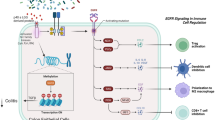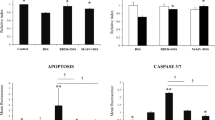Abstract
Exclusive enteral nutrition using polymeric formula (PF) is a well-established therapeutic option for active Crohn’s disease; however, its mechanisms of action are unknown. We investigated the anti-inflammatory effects of PF in an in vitro model of epithelial cell inflammation. PF did not affect cell viability over a range of dilutions, but when PF was added to the culture medium the interleukin (IL)-8 response to proinflammatory stimuli was significantly reduced. This effect was due to PF acting directly on the cells as the IL-8 response was still reduced when PF was separated from the proinflammatory stimuli in a 2-compartment system. In the presence of PF, nuclear factor (NF)-κB nuclear migration was not inhibited; however, IκBα degradation was delayed. PF has direct anti-inflammatory effects upon immortalized colonic enterocytes. Therefore PF may, in part, modulate gut inflammation by directly reducing the inflammatory response of the intestinal epithelium.





Similar content being viewed by others
References
Binder V (2004) Epidemiology of IBD during the twentieth century: an integrated view. Baillieres Best Pract Res Clin Gastroenterol 18:463–479
Kim SC, Ferry GD (2004) Inflammatory bowel diseases in pediatric and adolescent patients: clinical, therapeutic, and psychosocial considerations. Gastroenterology 126:1550–1560
Phavichitr N, Cameron DJ, Catto-Smith AG (2003) Increasing incidence of Crohn’s disease in Victorian children. J Gastroenterol Hepatol 18:329–332
Schmidt C, Stallmach A (2005) Etiology and pathogenesis of inflammatory bowel disease. Minerva Gastroenterol Dietol 51:127–145
Lissauer T, Clayden G (2004) Gastroenterology. In: Illustrated textbook of paediatrics. Mosby, St. Louis, pp 182–183
Griffiths AM (2004) Specificities of inflammatory bowel disease in childhood. Baillieres Best Pract Res Clin Gastroenterol 18:509–523
Goh J, O’Morain CA (2003) Review article: nutrition and adult inflammatory bowel disease. Aliment Pharmacol Ther 17:307–320
Thomas AG, Taylor F, Miller V (1993) Dietary intake and nutritional treatment in childhood Crohn’s disease. J Pediatr Gastroenterol Nutr 17:75–81
Heuschkel RB, Menache CC, Megerian JT, Baird AE (2000) Enteral nutrition and corticosteroids in the treatment of acute Crohn’s disease in children. J Pediatr Gastroenterol Nutr 31:8–15
Ruuska T, Savilahti E, Maki M, Ormala T, Visakorpi JK (1994) Exclusive whole protein enteral diet versus prednisolone in the treatment of acute Crohn’s disease in children. J Pediatr Gastroenterol Nutr 19:175–180
Lochs H, Steinhardt HJ, Klaus-Wentz B, Zeitz M, Vogelsang H, Sommer H, Fleig WE, Bauer P, Schirrmeister J, Malchow H (1991) Comparison of enteral nutrition and drug treatment in active Crohn’s disease. Results of the European Cooperative Crohn’s Disease Study. IV. Gastroenterology 101:881–888
Malchow H, Steinhardt HJ, Lorenz-Meyer H, Strohm WD, Rasmussen S, Sommer H, Jarnum S, Brandes JW, Leonhardt H, Ewe K (1990) Feasibility and effectiveness of a defined-formula diet regimen in treating active Crohn’s disease. European Cooperative Crohn’s Disease Study III. Scand J Gastroenterol 25:235–244
O’Morain C, Segal AW, Levi AJ (1984) Elemental diet as primary treatment of acute Crohn’s disease: a controlled trial. Br Med J 1859–1862
Zoli G, Care M, Parazza M, Spano C, Biagi PL, Bernardi M, Gasbarrini G (1997) A randomized controlled study comparing elemental diet and steroid treatment in Crohn’s disease. Aliment Pharmacol Ther 11:735–740
Day AS, Whitten KE, Lemberg DA, Clarkson C, Vitug-Sales M, Jackson R, Bohane TD (2004) Exclusive enteral nutrition as primary therapy in children with Crohn’s disease. J Gastroenterol Hepatol 19:A277
Griffiths AM, Ohlsson A, Sherman PM, Sutherland LR (1995) Meta-analysis of enteral nutrition as a primary treatment of active Crohn’s disease. Gastroenterology 108:1056–1067
Verma S, Brown S, Kirkwood B, Giaffer MH (2000) Polymeric versus elemental diet as primary treatment in active Crohn’s disease: a randomized, double-blind trial. Am J Gastroenterol 95:735–739
Ludvigsson JF, Krantz M, Bodin L, Stenhammar L, Lindquist B (2004) Elemental versus polymeric enteral nutrition in paediatric Crohn’s disease: a multicentre randomized controlled trial. Acta Paediatr 93:327–335
Beattie RM, Bentsen BS, MacDonald TT (1998) Childhood Crohn’s disease and the efficacy of enteral diets. Nutrition 14:345–350
Breese EJ, Michie CA, Nicholls SW, Murch SH, Williams CB, Domizio P, Walker-Smith JA, MacDonald TT (1994) Tumor necrosis factor alpha-producing cells in the intestinal mucosa of children with inflammatory bowel disease. Gastroenterology 106:1455–1466
Fell JM, Paintin M, Arnaud-Battandier F, Beattie RM, Hollis A, Kitching P, Donnet-Hughes A, MacDonald TT, Walker-Smith JA (2000) Mucosal healing and a fall in mucosal pro-inflammatory cytokine mRNA induced by a specific oral polymeric diet in paediatric Crohn’s disease. Aliment Pharmacol Ther 14:281–289
Breese EJ, Michie CA, Nicholls SW, Williams CB, Domizio P, Walker-Smith JA, MacDonald TT (1995) The effect of treatment on lymphokine-secreting cells in the intestinal mucosa of children with Crohn’s disease. Aliment Pharmacol Ther 9:547–552
Ferguson A, Glen M, Ghosh S (1998) Crohn’s disease: nutrition and nutritional therapy. Baillieres Clin Gastroenterol 12:93–114
Meister D, Bode J, Shand A, Ghosh S (2002) Anti-inflammatory effects of enteral diet components on Crohn’s disease-affected tissues in vitro. Dig Liver Dis 34:430–438
Lionetti P, Callegari ML, Ferrari S, Cavicchi MC, Pozzi E, de Martino M, Morelli L (2005) Enteral nutrition and microflora in pediatric Crohn’s disease. J Parenter Enteral Nutr 29:S173–S178
Caradonna L, Amati L, Magrone T, Pellegrino NM, Jirillo E, Caccavo D (2000) Enteric bacteria, lipopolysaccharides and related cytokines in inflammatory bowel disease: biological and clinical significance. J Endotoxin Res 6:205–214
Sartor RB (1997) Pathogenesis and immune mechanisms of chronic inflammatory bowel diseases. Am J Gastroenterol 92:5S–11S
Hoffmann E, Dittrich-Breiholz O, Holtmann H, Kracht M (2002) Multiple control of interleukin-8 gene expression. J Leukoc Biol 72:847–855
Chang EB, Sitirin MD, Black DD (1996) Gastrointestinal, hepatobiliary, and nutritional physiology. Philadelphia: Lippincott-Raven
Schreiber S, Nikolaus S, Hampe J (1998) Activation of nuclear factor kappa B inflammatory bowel disease. Gut 42:477–484
Auphan N, DiDonato JA, Rosette C, Helmberg A, Karin M (1995) Immunosuppression by glucocorticoids: inhibition of NF-kappa B activity through induction of I kappa B synthesis. Science 270:286–290
Baeuerle PA, Baltimore D (1996) NF-kappa B: ten years after. Cell 87:13–20
Baldwin ASJ (1996) The NF-kappa B and I kappa B proteins: new discoveries and insights. Annu Rev Immunol 14:649–683
Oz HS, Ray M, Chen TS, McClain CJ (2004) Efficacy of a transforming growth factor beta 2 containing nutritional support formula in a murine model of inflammatory bowel disease. J Am Coll Nutr 23:220–226
Campos FG, Waitzberg DL, Teixeira MG, Mucerino DR, Habr-Gama A, Kiss DR (2002) Inflammatory bowel diseases: principles of nutritional therapy. Rev Hosp Clin Fac Med Sao Paulo 57:187–198
Kulkarni AB, Huh CG, Becker D, Geiser A, Lyght M, Flanders KC, Roberts AB, Sporn MB, Ward JM, Karlsson S (1993) Transforming growth factor beta 1 null mutation in mice causes excessive inflammatory response and early death. Proc Natl Acad Sci U S A 90:770–774
Dignass AU, Podolsky DK (1993) Cytokine modulation of intestinal epithelial cell restitution: central role of transforming growth factor beta. Gastroenterology 105:1323–1332
Planchon SM, Martins CA, Guerrant RL, Roche JK (1994) Regulation of intestinal epithelial barrier function by TGF-beta 1. Evidence for its role in abrogating the effect of a T cell cytokine. J Immunol 153:5730–5739
Kutuk O, Basaga H (2004) Aspirin inhibits TNFalpha- and IL-1–induced NF-kappaB activation and sensitizes HeLa cells to apoptosis. Cytokine 25:229–237
Author information
Authors and Affiliations
Corresponding author
Rights and permissions
About this article
Cite this article
de Jong, N.S.H., Leach, S.T. & Day, A.S. Polymeric Formula Has Direct Anti-Inflammatory Effects on Enterocytes in an in VitroModel of Intestinal Inflammation. Dig Dis Sci 52, 2029–2036 (2007). https://doi.org/10.1007/s10620-006-9449-x
Received:
Accepted:
Published:
Issue Date:
DOI: https://doi.org/10.1007/s10620-006-9449-x




